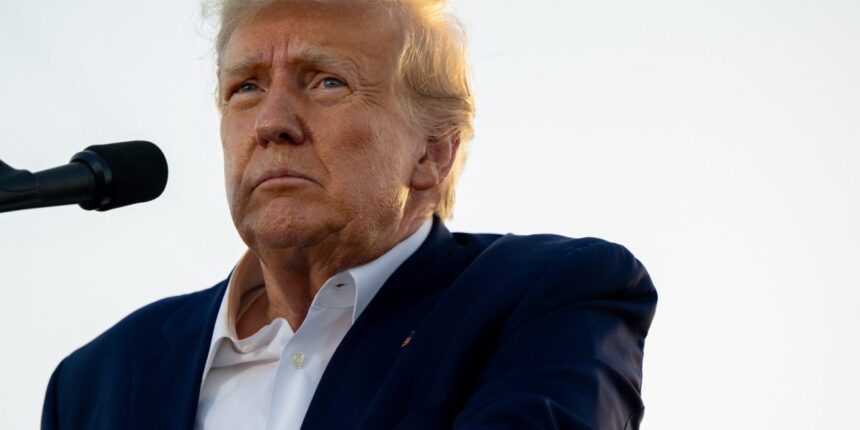
If 2023 has taught anything to the people running Fox News, it’s the importance of being able to pivot.
The decision by former President Donald Trump to skip Wednesday’s first debate of the 2024 presidential primary season likely deprives Fox of a huge late-summer audience. Even worse for the network, Trump has talked of appearing in an online interview with former Fox star Tucker Carlson at the same time.
Trump’s announcement on Sunday wasn’t necessarily a surprise. Fox debate moderators Bret Baier and Martha MacCallum had been preparing for two events — one if he were there and one if he wasn’t.
Several Fox personalities this summer publicly urged Trump to attend the event, and Fox executives privately made the same argument to the former president. His former press secretary, Kayleigh McEnany, called Trump’s decision a “huge political miscalculation” Monday on Fox.
Despite Trump’s lead over other Republicans in polls, MacCallum cautioned potential viewers against dismissing a debate without him as a junior varsity event. She cited a recent poll by The New York Times and Siena College, taken July 23-27, that showed nearly half of Trump backers in Iowa said they were open to other candidates.
“I don’t think as members of the media or people who watch politics it’s our place to say, ‘Oh, this is over, these people aren’t going to be the nominee,’” she said. “It’s way too soon to say that.”
Trump’s first appearance in a GOP primary debate brought 24 million viewers to Fox in 2015. It would be next to impossible to reach those numbers again, given his novelty has worn off and cord-cutting has diminished cable news audiences. Yet when only 12.5 million watched a January 2016 Fox debate that Trump skipped, that gave an indication of his drawing power.
This summer’s debate has been anticipated as a beacon for Fox News, which endured months of embarrassing headlines earlier this year related to Dominion Voting Systems’ defamation lawsuit for the network’s coverage of bogus claims by Trump after the 2020 election.
As the trial was about to start, Fox agreed to pay $787.5 million to Dominion in a settlement.
The lawsuit had little discernible impact on Fox’s viewers, but when Fox fired Carlson with no explanation a week later, those fans hit back hard. The network never publicly explained why Carlson was fired, although his appearance in court papers released with the Dominion case led to several public theories being advanced.
As it has in the past, Fox relied on its bench in establishing a new lineup that debuted in July, giving prime time shows to Jesse Watters and Greg Gutfeld, popular panelists on “The Five.” Their shows sandwich Sean Hannity on the schedule, offering a continuation of biting conservative commentary.
Fox’s prime-time audience averaged 2.5 million this year through Carlson’s firing, and 1.6 million for the nearly two months before the new lineup premiered. Its prime-time audience has since rebounded to 2.2 million, according to the Nielsen company.
“There has been a sense of stabilization with the new lineup,” said Steve Krakauer, publisher of the “Fourth Watch” newsletter and author of “Uncovered: How the Media Got Cozy with Power, Abandoned its Principles and Lost the People.”
How much Trump’s four criminal indictments will be discussed onstage in Milwaukee is an open question, in part dependent upon what his opponents want to talk about.
Even without Trump’s participation on Wednesday, “he will be on the stage even if he’s not on the stage,” Baier said in an interview.
The Siena College-Times survey suggests that it wouldn’t be a popular topic among regular Fox viewers. The poll found 78% of people who regularly get news from Fox said Trump has not committed any serious federal crimes, and that 80% said that the GOP should stand behind Trump in the cases.
Krakauer said Fox would hardly be unique among the media in wanting to give its audience what it wants, and suggested there may be some “indictment fatigue” among the audience.
Even a debate that avoids the indictments as a major topic would still likely wind up being a lot about Trump, with discussions about whether or not he was successful in tackling issues like immigration or the economy, he said.
Baier said such poll findings won’t be a factor in how he and MacCallum structure the debate.
“Of course we’ll bring it up,” MacCallum said. “I expect that the candidates will bring it up in part as well. And to the extent that there’s indictment fatigue, there are so many other issues we’re going to be talking about on the stage, it’s certainly not going to be the lion’s share of the night.”
The event features a live audience, which isn’t unusual. But the crowd at CNN’s Trump town hall in New Hampshire this spring proved distracting and wasn’t a high point.
“If we have to quiet them down at points, well, that’s part of what the moderator’s job is,” MacCallum said. “But I think it’s actually going to be additive to the night.”
Both Baier and MacCallum have done these debates before. Baier even had the identical experience in January 2016 of preparing for Trump to possibly be there before he backed out.
Both have similar goals, familiar to moderators but often unspoken.
“If I can get out of the end of the debate and somebody says, ‘You know what, that was tough but fair, I’d be really happy,” Baier said. “And if it’s a story that’s not about the moderators, I’m even more happy.”








